DAVAO CITY (MindaNews / 28 September) – On this gloomy Thursday morning, Enrico Angalan is in his farm in a mountain village of predominantly Obu Manobos in Barangay Tawan-Tawan, Baguio District, fixing the plastic bag wrapping the now maroon-colored cacao pod. He expects to harvest the cash crop in October.
It is his usual routine. As it was even during the most restrictive lockdown, when people were forced to stay home to stop the spread of the highly contagious SARS-CoV 2, the virus that causes COVID-19.
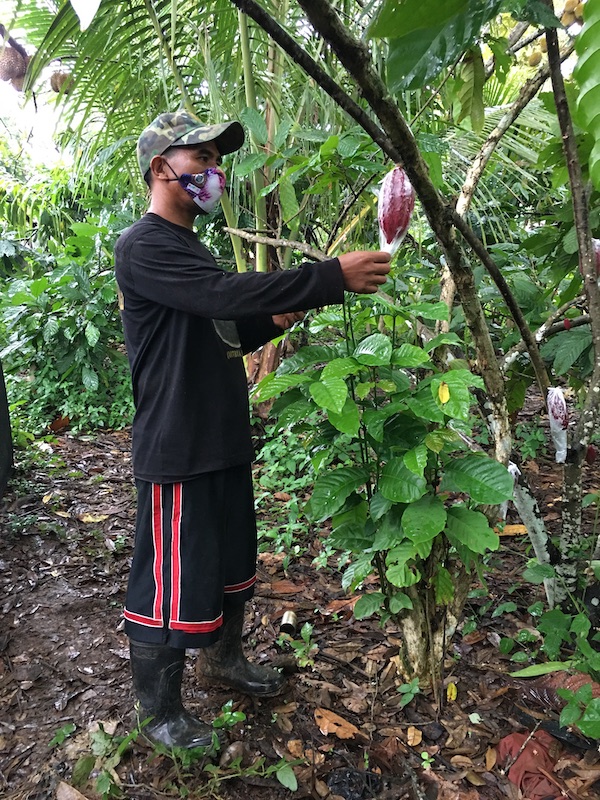 Obu-Manobo Enrico Angalan checks on the fruits of his cacao tree in his farm in Brgy. Tawan-Tawan, Baguio District, Davao City. The indigenous peoples living in this area, mostly Obu-Manobo and Bagobo-Klata, grow cacao, banana, and durian as their main livelihood. MindaNews photo by ROB GUMBA
Obu-Manobo Enrico Angalan checks on the fruits of his cacao tree in his farm in Brgy. Tawan-Tawan, Baguio District, Davao City. The indigenous peoples living in this area, mostly Obu-Manobo and Bagobo-Klata, grow cacao, banana, and durian as their main livelihood. MindaNews photo by ROB GUMBA
The COVID-19 pandemic disrupted the livelihood of this city’s 1.67 million residents, especially under Enhanced Community Quarantine (ECQ) from April 4 to May 15. Businesses and companies were partially or totally closed leaving thousands of people jobless.
Data from the Labor Force Survey released by the Philippine Statistics Authority showed 351,000 workers in Davao Region were displaced as of April 2020, a 400 per cent increase from the 62,000 unemployed individuals in the same period in 2019.
In June, the Department of Labor of Employment in Davao Region estimated at least 10,000 business establishments in the region were affected by the series of lockdowns.
DOLE-Davao mediator-arbitrator Connie Torralba explained that these establishments either totally closed or reduced the number of their workers.
Trade and commerce also slowed down as the city temporarily stopped the operations of public markets and public and private transportation except for “essential workers.” The Davao region also imposed inter-regional lockdowns. Those who lost their jobs and livelihood struggled to fend for their families or for themselves.
For the Lumads (Indigenous Peoples or IPs) in the far-flung areas of the city, the economic impact of the health crisis has not been as bad as those living in the urban area, Angalan said, even as their main source of livelihood – agriculture and crafts-making – lost a significant part of the market due to the series of lockdowns in the city: Community Quarantine (CQ) from mid-March to April 4; ECQ from April 4 to May 15, General Community Quarantine (GCQ) from May 16 until June 30 and Modified GCQ since July 1.
Still normal life
Angalan grows cacao, banana, and durian in his farm in Mt. Tipolog, a mountain village located in Barangay Tawan-Tawan, the ancestral domain of the Obu Manobo and Bagobo Klata, about an hour’s ride away from downtown Davao City.
He usually tends to his farm during the flowering to fruiting stages of cacao and durian, from January to September.
Banana, he said, has a different season. He harvests the fruit almost every 15 days. His buyers would go to the village to take his produce.
While waiting to harvest other crops, Angalan earns for the daily needs of his family, by tending to and cleaning other farms for a fee, almost every day.
Since the start of the lockdowns in mid-March, Angalan’s routine has been the same.
Carrying their Food and Medicine passes, his buyers would come to collect his harvest at the barangay center, a three-hour hike from his farm in the mountain,
Agriculture being an essential sector, they continued farming even during the lockdown.
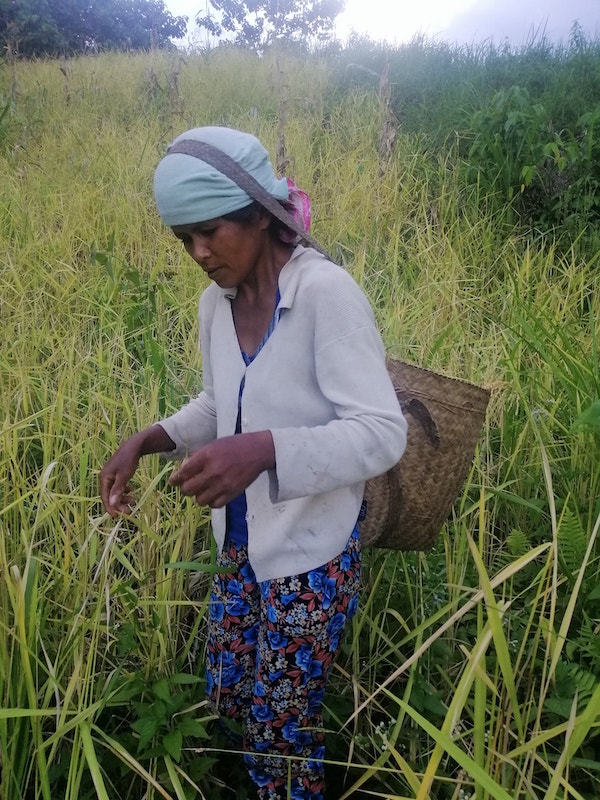 A Matigsalug woman harvests upland rice grains in their farm. Photo by KANAKAN JULIETO DALAGMA
A Matigsalug woman harvests upland rice grains in their farm. Photo by KANAKAN JULIETO DALAGMA
During the ECQ, Jhony Dalapan, another Obu-Manobo farmer, complained about the increase in tricycle fare going to Calinan Public Market, the nearest market to Tawan-Tawan where he sells his vegetable harvest.
Prices of vegetables dropped, he said, as bulk buyers now commanded the price. He explained that buyers refused to purchase more because the public markets were either closed or had limited foot traffic.
He was left with no choice but to sell at a lower price, or let his vegetables rot.
Angalan said the farmgate price of bananas became favorable beginning July, from the usual 20 to 25 pesos per kilo to 38 to 40 pesos. July was when the city’s quarantine status was changed to the less restrictive MGCQ. As of September 27, the city remains under MGCQ.
Bae Judith Gumapac, another Obu-Manobo and chair of the Barangay Tawan-Tawan Tribal Council Committee on Agriculture, said the community quarantines gave the Lumads more time to tend, weed, and plant in their farms.
“Ang sa una nga nabiyaan, karon hinlo na. Naa nay tanom (The farms left unattended to prior to COVID-19 are now clean and planted with seedlings),” she said.
Matigsalugs also experienced the same thing. This indigenous tribe mostly inhabits Marilog District which is around 90 minutes from downtown.
According to Kanakan Julieto Dalagma, a Matigsalug volunteer community organizer and program manager of the Bahay Pangarap Indigenous People’s High School Student Shelter, the Matigsalugs continued with their daily activities even during the lockdowns.
He said the Lumads even had a bountiful harvest of vegetables during the lockdowns because they were able to maintain their farms.
Dalagma was able to monitor the Lumads’ situation because he worked in the communities of his fellow Matigsalugs and their Ata-Manobo neighbors.
He recalled how difficult it was initially with the suspension of public transportation and the temporary closure of public markets because they ended up with rotten tomatoes and other vegetables. There were no buyers in Bankerohan – the city’s main public market — and other public markets were closed.
What helped them through was the financial assistance and relief goods extended by the government such as the Social Amelioration Program and Pantawid Pamilyang Pilipino Program of the Department of Social Welfare and Development and those from the City Government of Davao.
Dalagma said the Lumads received relief goods like rice and other assistance from the government.
Gumapac said the relief goods from the city government encouraged the Lumads to stay in their homes and the limited movements forced some of them to spend the money on daily needs.
Before the pandemic, she said, they spared budget for liquor. But during the community quarantine, the money was spent on food and other basic necessities. In fact, she said, no drunk-related accidents happened during the lockdowns.
Mayor Sara Duterte imposed a liquor ban from 5 p.m. to 8 a.m. starting March 18 and extended it further to 24 hours on April 6 when the city was under ECQ.
She lifted the ban on September 21.
Alternative source of income
Dalagma said he also helped the Matigsalugs and the Ata-Manobos earn extra income aside from their farm produce by selling liyang or multipurpose baskets made out of wild bamboo (dinochcloa scandens), rattan and abaca fiber.
The Matigsalugs and the Ata-Manobos weave baskets during harvest season to hold their crops. They would sell some of these during the Kadayawan festivities in August.
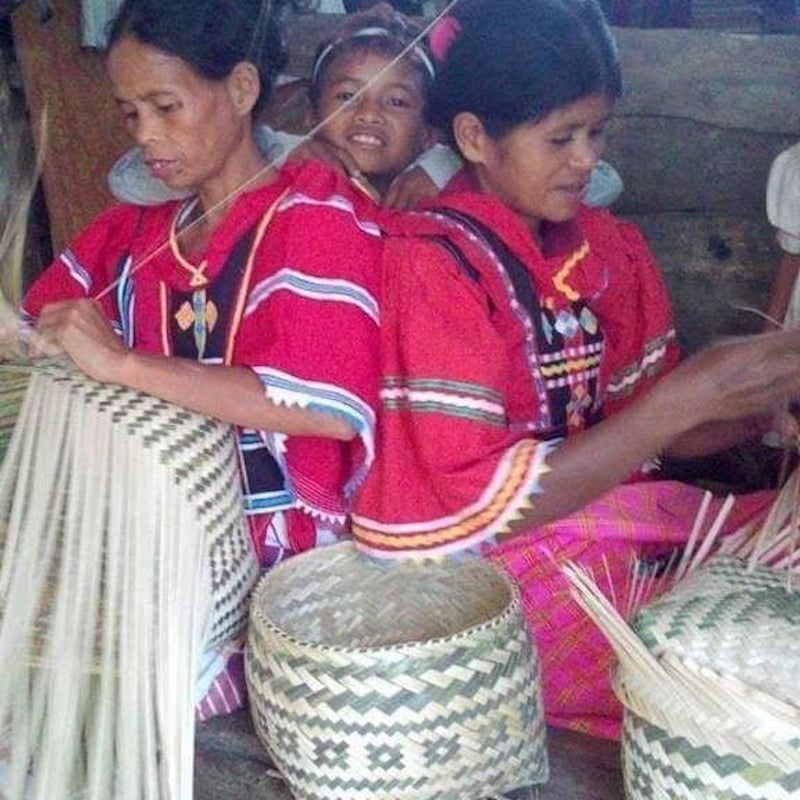 Two Matigsalug women in Sitio Nangalid, Datu Salumay, Marilog District painstakingly shape bamboo strips into multipurpose baskets. Photo by KANAKAN JULIETO DALAGMA
Two Matigsalug women in Sitio Nangalid, Datu Salumay, Marilog District painstakingly shape bamboo strips into multipurpose baskets. Photo by KANAKAN JULIETO DALAGMA
But the lockdown-triggered fad of collecting plants during the quarantine, especially in downtown Davao, triggered a demand for the baskets.
He said the weaving of baskets continues until today due to the high demand, giving the Lumads another income stream.
But even if Kadayawan was not celebrated this year, the Lumads still earned because the baskets are sold online and people buy them for their indoor plants.
He sells the baskets through the Facebook page Dalagma Netibong Produkto, the page for his advocacy business Dalagma Native Products. He said he founded the business and registered it with the Department of Trade and Industry prior to the pandemic to support the community works within the ancestral domain and to help the tribes earn enough income for their families and students. He also posts photos of the baskets on his personal Facebook account.
Dalagma is currently supporting about 20 weavers in five communities in Marilog District – Sitios Nangalid in Barangay. Datu Salumay, Sitios Tibal-og and Malikongkong in Barangay Marilog, and Barangay Malabog, and in Paquibato District by buying their crafts and reselling them in the city center.
Dalagma says he pays the basket weavers enough to sustain their daily needs. He also allows them to ask payment in advance.
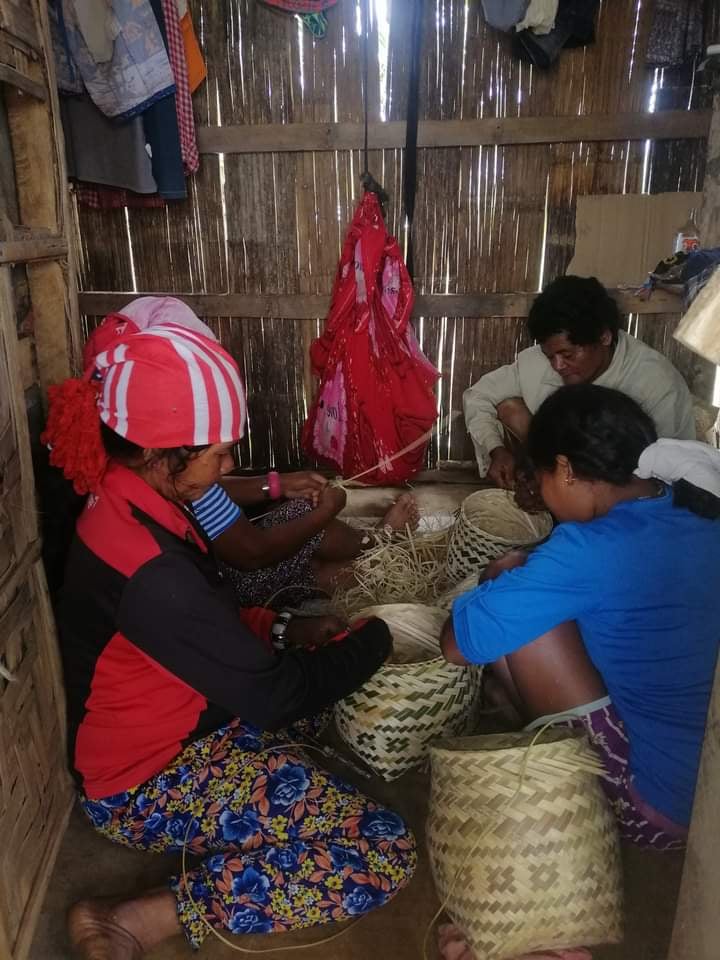 Matigsalugs in Sitio Tibal-og, Marilog District work on several basket orders which will be sold in downtown Davao for additional income during the COVID-19 pandemic. Photo by KANAKAN JULIETO DALAGMA
Matigsalugs in Sitio Tibal-og, Marilog District work on several basket orders which will be sold in downtown Davao for additional income during the COVID-19 pandemic. Photo by KANAKAN JULIETO DALAGMA
The income from the baskets, he said, is used to support the needs of the indigent junior and senior high school Lumad students, most of them children of his Matigsalug and Ata-Manobo weavers.
He currently billets 10 Lumad students in Bahay Pangarap, a temporary shelter in Blsisful Family Village in Barangay Indangan for Lumad students who are and will be studying in schools downtown.
Health protocols and IPs’ access to health care
While the COVID-19 cases in the city have reached 1,847 as of September 26, there has been no Lumad recorded to have contracted COVID-19, according to Angalan.
He attributed this to the Barangay Local Government Units’ strict implementation of health protocols and their constituents’ obedience.
Based on Davao City’s Covid-19 Risk Assessment for the period of September 25 to October 1, Baguio and Marilog districts were among those classified as Low Risk Areas.
Barangays Tawan-Tawan, Carmen, and Baguio Proper in Baguio District and Dalag and Tamugan in Marilog District were categorized as Moderate Risk Areas only once, from July 25 to July 31. Barangays under this classification may be visited but with utmost caution.
Angalan said residents faithfully comply with the protocols even as they feel uncomfortable with the cumbersome face mask and face shield especially when they are in places of convergence like public markets.
But he noted that observance of health protocols, including the observance of physical distancing, is not strictly observed in the mountains as residents are confident there are no COVID-19 cases yet, there are no gatherings because everyone is busy in their farms, and houses are far apart.
He said they are safe from infection for as long as no COVID-19 case reaches their mountain villages.
Barangay officials and health workers had vowed to inform residents if there are COVID-19 cases in their barangay. The officials, he said, never fail to explain and remind them of the importance of following health protocols.
Gumapac said the Lumads tend to trust explanations and precautions coming from people who belong to their tribe. She cited former barangay captain Danilo Gumapac, also an Obu-Manobo, who makes an effort to explain the disease to the members of the community. Danilo is her brother in law.
Residents also get updates through their solar-powered or battery-powered radios and a few television channels.
For sanitation, Angalan said their water source is the Panigan River at the foot of Mt. Tipolog and from the springs surrounding it.
Purok level
Residents in Tawan-Tawan are also getting medical attention from their barangay health center near their barangay hall.
Luzviminda Caintic, barangay health worker (BHW), said they regularly roam around their assigned puroks to remind residents of the health protocols, check on their health condition, and administer the usual health services.
She said they find time to visit puroks located in the mountains.
“Gina-house to house namo sila para ma monitor ang ilang kahimtang sa mga IPs ug dili mga IPs (We make rounds in their houses to monitor their health, IPs or non-IPs),” she said.
Monitoring the implementation of the health protocols involves a team of 20 BHWs, supervised by a head nurse.
She said each BHW keeps an eye on their assigned puroks and informs the team about the impending arrival of locally-stranded individuals (LSIs) or Returning Overseas Filipinos (ROFs).
Arriving residents who have already been quarantined in downtown Davao City will still be subjected to another 14-day quarantine in the mountain villages even if they present a negative swab test result.
Currently, there are two isolation facilities in Tawan-Tawan – an old barangay hall with two rooms, and a day-care center. But the Barangay Health Unit plans to build additional isolation rooms near the existing ones after learning that isolation rooms in downtown Davao are running low.
She said they are taking extra precautions because their location is far from the downtown area and there are small children.
District hospital
Dalagma said the Lumads are getting health services from the Marilog District Hospital in Sitio Kibalang and the Buda Community Health Care Center – Committee of German Doctors in Buda, both in Marilog District.
He said the latter, a Category I private infirmary as of 2014, has been providing services to Matigsalugs for free.
However, he is worried that its resources will be depleted soon. He said the hospital hd even signified to cease operations but was prevailed upon by the Lumads to remain.
He hopes government will provide assistance to keep the infirmary running as it provides free health services to them.
Way of Life
The World Health Organization had earlier said staying healthy makes one less vulnerable to COVID-19.
While residents in the urban area made adjustments on their diet and exercise, the Lumads maintained their lifestyle — before COVID and during COVID.
He said Lumads walk longer distances just to reach another community or their neighbors, and grow their food free of synthetic chemicals.
While residents downtown recreate nature in their concrete homes by surrounding themselves with plants to clean the air they breathe or keep their sanity, the Lumads are close to nature, pray to spirits for protection through rituals.
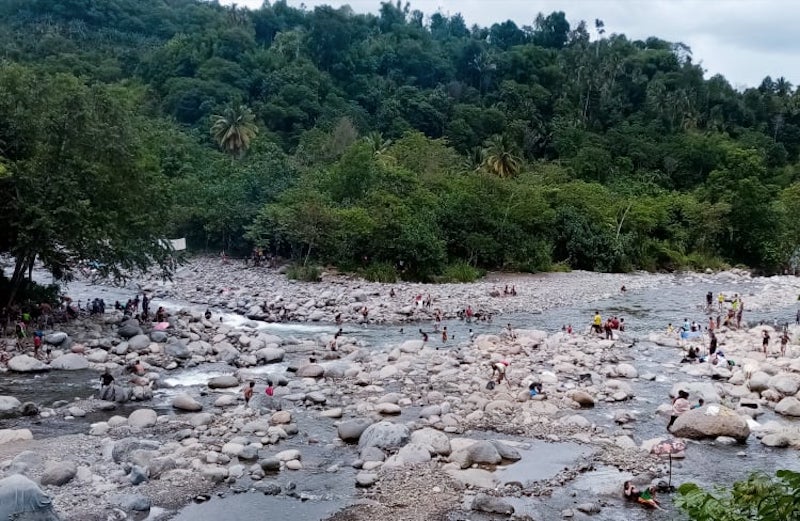 Spending time in the Panigan River is what a day would look like for the indigenous peoples living in Brgy Tawan-Tawan, Baguio District in Davao City during the time of the COVID-19 pandemic. Photo by PRINCESS ERICKA LAMBAC PAGAYAO.
Spending time in the Panigan River is what a day would look like for the indigenous peoples living in Brgy Tawan-Tawan, Baguio District in Davao City during the time of the COVID-19 pandemic. Photo by PRINCESS ERICKA LAMBAC PAGAYAO.
“Usa pud nga nakamaayo sa amoa, sayo pa kaayo mubaktas na. Muadto nag sapa, manglaba, muadto mag trabaho sa uma (We are used to hiking early in the rmorning. We go to the rivers, we wash our clothes, we work in our farms),” Gumapac said.
She noted that children rarely get sick because they take a bath in the rivers daily and are physically active.
Dalagma explained that while gardening and growing one’s own food in their own backyard and ensuring it is organic, have become the fad during the quarantine in the urban center, but for the Lumads., it is their way of life.
Angalan continues checking on his cacao pods. Although not so much has changed in the way they live, he hopes the COVID-19 pandemic will be over or a vaccine will be available soon so he can sell his cacao and durian to more buyers and make the most of opportunities to earn for his family. (Roberto A. Gumba, Jr. / MindaNews. The production of this special report was made possible with support from Internews’ Earth Journalism Network
